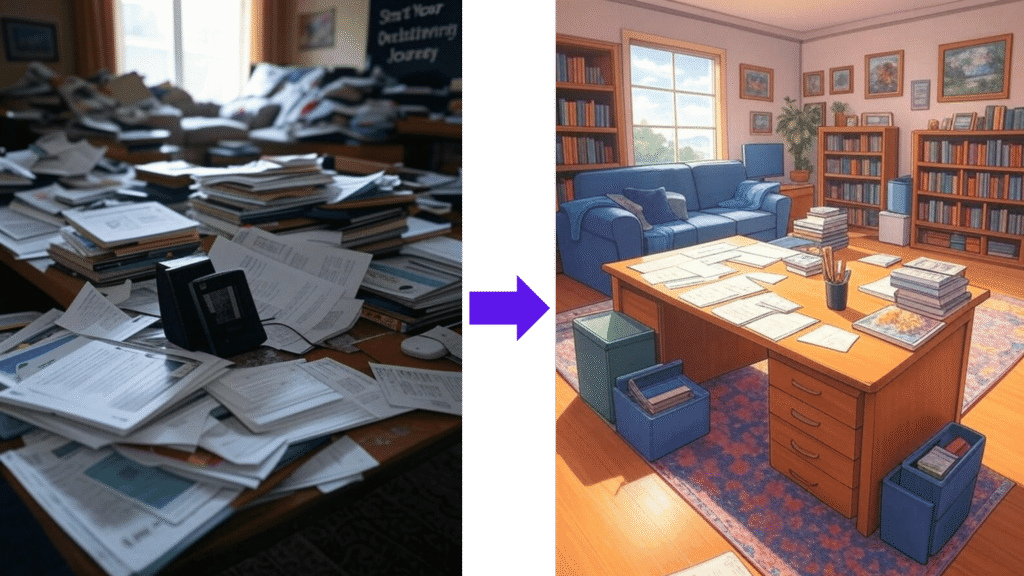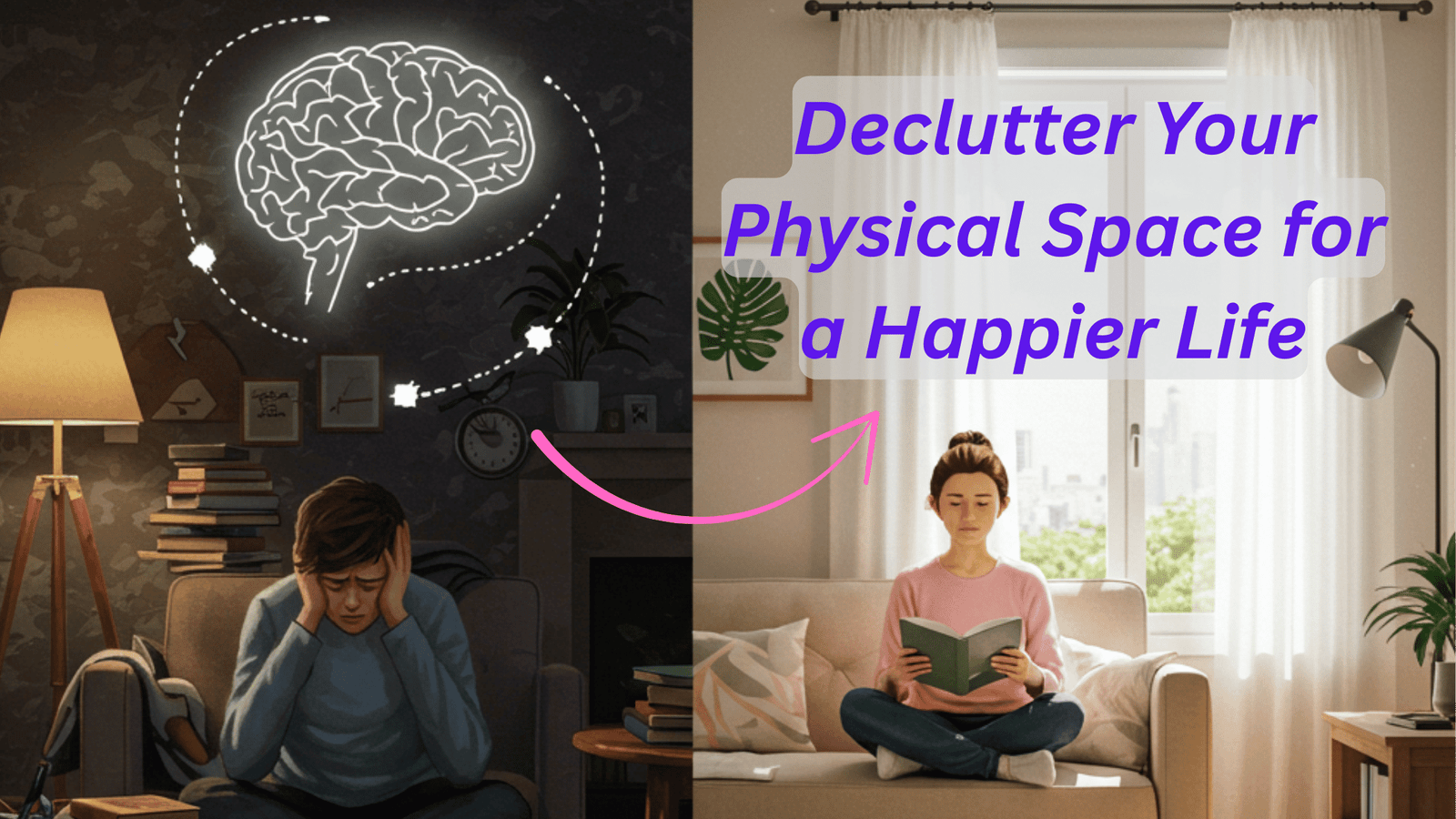Decluttering your home is more than just tidying up or making your space look neat—it’s a powerful way to enhance your overall well-being. A cluttered home often mirrors a cluttered mind, leading to feelings of stress, anxiety, and overwhelm. When your surroundings are chaotic, it can be hard to focus, relax, or feel in control. By taking the time to declutter your home, you create a calm, organized, and peaceful environment that not only boosts your mood but also improves mental clarity and productivity.
The benefits of decluttering go beyond aesthetics. A clean, organized space can reduce stress, improve focus, and even enhance your relationships by fostering a sense of harmony at home. Whether you’re tackling a single room or your entire house, the act of letting go of unnecessary items can feel liberating, giving you a fresh start and a renewed sense of purpose. Plus, a decluttered home is easier to maintain, saving you time and energy in the long run.
In this blog, we’ll explore practical decluttering tips, the psychological benefits of an organised space, and how to create a home that supports your mental and emotional well-being. Ready to transform your space and your life? Let’s dive into the art of decluttering and discover how a clutter-free home can lead to a happier, healthier you.
- Why We Hold Onto Clutter: Understanding the Emotional and Practical Barriers
- How Clutter Affects Your Brain and Mental Health
- The Ripple Effect: How Clutter Impacts Your Life
- How to Start Your Decluttering Journey: A Beginner’s Guide to a Clutter-Free Home
- Conclusion: Embrace the Power of a Clutter-Free Life
Why We Hold Onto Clutter: Understanding the Emotional and Practical Barriers
Decluttering your home can feel like an uphill battle, and it’s not just about being lazy or disorganized. Many of us struggle to let go of our possessions due to deep-rooted emotional, psychological, and practical reasons. Understanding why we hold onto stuff is the first step toward overcoming these barriers and creating a clutter-free space that supports your well-being. Below, we explore the key reasons behind our attachment to clutter and offer insights to help you start letting go.

Emotional Ties: The Power of Memories
Our belongings often carry sentimental value, acting as tangible connections to cherished memories, loved ones, or past versions of ourselves. That old sweater from your college days or a trinket from a family vacation can feel like a piece of your history. Letting go of these items can seem like losing a part of your story, even if they no longer serve a practical purpose. This emotional attachment is one of the biggest reasons we hold onto clutter, making decluttering feel like an emotional journey as much as a physical one.
“Just In Case” Thinking: Fear of Future Regret
We’ve all kept something “just in case” we need it later—a pair of jeans that no longer fit, an outdated gadget, or a stack of old notebooks. This mindset stems from a fear of regret or scarcity, where we worry that discarding an item might leave us unprepared for some future need. Unfortunately, this leads to hoarding items we rarely, if ever, use, adding to the clutter that overwhelms our homes and minds.
Too Many Choices: Decision Fatigue
When faced with a pile of possessions, deciding what to keep, donate, or toss can feel paralyzing. The sheer volume of choices can lead to decision fatigue, causing us to procrastinate and let clutter pile up. Whether it’s sorting through a closet full of clothes or a drawer stuffed with miscellaneous items, the mental effort required to make these decisions often keeps us stuck in a cycle of clutter.
Guilt: The Weight of Obligation
Guilt is a powerful force that keeps us tethered to things we don’t need. That expensive kitchen gadget you never use, a gift from a well-meaning friend, or items you think “could be useful” to someone else can be hard to part with. We feel obligated to keep these things, even if they’re taking up valuable space and contributing to stress. This guilt can make decluttering feel like a moral dilemma rather than a practical task.
Breaking Free from Clutter
Recognizing these reasons for holding onto stuff is the first step toward a clutter-free home. By addressing emotional attachments, challenging “just in case” thinking, simplifying decision-making, and letting go of guilt, you can start to reclaim your space and create a more peaceful environment. In the next sections, we’ll share practical decluttering tips, strategies to overcome emotional barriers, and ways to maintain a clutter-free home for the long term.
Ready to let go of clutter and embrace a simpler, more organized life? Keep reading to discover actionable steps to declutter your home and transform your space into a haven of calm and clarity.
How Clutter Affects Your Brain and Mental Health
Clutter is more than just a messy room—it can have a profound impact on your brain and mental well-being. A cluttered environment overwhelms your mind, creating stress and making it harder to focus, relax, or feel in control. Understanding how clutter affects your brain and mental health can motivate you to take action and create a calmer, more organized space. In this section, we’ll explore the science behind clutter’s impact, its connection to mental health challenges, and why decluttering can be a game-changer for your mind.
The Science of Clutter: How It Overwhelms Your Brain
Your brain is constantly processing the world around you, trying to make sense of the visual information in your environment. When your home is filled with clutter—piles of clothes, scattered papers, or overflowing shelves—it creates “visual noise” that overstimulates your brain. This sensory overload makes it harder to concentrate, process information, or stay productive.

Research backs this up: studies from institutions like UCLA’s Center on Everyday Lives and Families have shown that cluttered homes can elevate cortisol levels (the stress hormone), particularly in women. A chaotic environment signals to your brain that there’s unfinished work, leading to feelings of stress, anxiety, and even mental fatigue. By reducing clutter, you can quiet this visual noise, helping your brain focus and fostering a sense of calm.
Clutter and Mental Health: A Deeper Connection
Clutter isn’t always just a bad habit—it can sometimes reflect or amplify deeper mental health challenges. Here’s how clutter intersects with your emotional and psychological well-being:
- Stress and Anxiety: A cluttered space can intensify feelings of overwhelm, creating a vicious cycle. When you’re already stressed or feeling low, finding the energy to tidy up can feel impossible. The mess then piles up, making you feel even worse, which further saps your motivation to declutter. This cycle can leave you feeling trapped in both your environment and your emotions.
- ADHD and Organization Challenges: For individuals with Attention Deficit Hyperactivity Disorder (ADHD), staying organized can be particularly difficult. ADHD often affects executive functioning skills like planning, prioritizing, and decision-making, which can lead to clutter buildup. The resulting mess can exacerbate feelings of frustration and inadequacy, making it harder to manage daily tasks.
- Hoarding Disorder: Beyond Messiness: Hoarding disorder is a serious mental health condition distinct from everyday clutter. People with hoarding disorder form intense emotional attachments to their possessions, experiencing extreme distress at the thought of parting with even seemingly insignificant items. This condition goes beyond disorganization and often requires professional intervention, such as therapy or support from mental health specialists.
Why Decluttering Matters for Mental Clarity
Clearing clutter isn’t just about creating a tidy home—it’s about reclaiming your mental space. A clutter-free environment can reduce stress, improve focus, and boost your mood, allowing you to feel more in control of your surroundings. Decluttering can also be a therapeutic process, helping you confront emotional attachments, break free from cycles of overwhelm, and create a space that supports your mental and emotional health.
Taking the First Step Toward a Clutter-Free Mind
Understanding how clutter affects your brain and mental health is the first step toward change. Whether you’re dealing with everyday mess, ADHD-related disorganization, or more complex issues like hoarding, small, intentional steps can make a big difference. In the following sections, we’ll share practical decluttering strategies, tips for overcoming emotional barriers, and resources for seeking professional help if needed.
Ready to transform your space and your mind? Keep reading to learn how to declutter your home, reduce stress, and create a peaceful environment that supports your mental well-being.
The Ripple Effect: How Clutter Impacts Your Life
Clutter does more than just create a messy home—it sends ripples through every aspect of your daily life, from your mental and physical health to your relationships and productivity. A cluttered environment can subtly (or not so subtly) disrupt your well-being, making it harder to live your best life. Understanding the far-reaching effects of clutter can inspire you to take action and create a space that supports your goals and happiness. Let’s explore how clutter impacts key areas of your life and why decluttering can be a transformative step toward a better you.
Sleep: Clutter’s Toll on Rest and Relaxation
Your bedroom should be a sanctuary for rest, but clutter can turn it into a source of stress. A messy bedroom—think overflowing laundry baskets, cluttered nightstands, or piles of miscellaneous items—creates visual chaos that makes it harder to unwind. Studies, like those from the National Sleep Foundation, suggest that a tidy, calming environment promotes better sleep quality. Clutter, on the other hand, can keep your mind racing, leading to difficulty falling asleep, restless nights, and even insomnia. Decluttering your bedroom can help you create a peaceful space that supports restful sleep and boosts your energy for the day ahead.
Productivity: How Clutter Hinders Focus and Efficiency
A cluttered environment is a productivity killer. Whether you’re working from home, tackling household tasks, or pursuing personal projects, a messy space makes it harder to stay focused and get things done. Clutter competes for your attention, creating distractions that slow you down and increase mental fatigue. For example, a cluttered desk can make it harder to find important documents, while a chaotic kitchen can turn meal prep into a frustrating ordeal. By decluttering your home, you can streamline your space, reduce distractions, and boost your efficiency, helping you accomplish more with less stress.
Relationships: The Social Cost of a Messy Home
Clutter doesn’t just affect you—it can strain your relationships with family, roommates, or friends. A messy home can spark arguments over shared responsibilities, creating tension with those you live with. It can also make you feel embarrassed or hesitant to invite friends over, leading to social isolation and feelings of loneliness. For instance, avoiding hosting gatherings because of a cluttered living space can limit your social connections and diminish your sense of community. Decluttering can transform your home into a welcoming space, fostering stronger relationships and making it a place where you’re proud to host loved ones.
Health and Safety: The Hidden Risks of Clutter
Clutter isn’t just an inconvenience—it can pose serious risks to your physical health and safety. Piles of belongings can create hazards in your home, including:
- Unsanitary Conditions: Cluttered spaces are harder to clean, leading to dust buildup, mold growth, or pest infestations, which can harm your respiratory health and overall well-being.
- Fire Hazards: Stacks of papers, clothes, or other flammable items increase the risk of fires, especially in cramped spaces with poor ventilation.
- Tripping and Falling: Cluttered floors or hallways can cause trips and falls, particularly for children, older adults, or those with mobility challenges.
- Poor Air Quality: Excessive clutter can trap dust and allergens, worsening allergies or asthma symptoms.
By addressing clutter, you can create a safer, healthier home environment that supports your physical well-being and peace of mind.
How to Start Your Decluttering Journey: A Beginner’s Guide to a Clutter-Free Home
Ready to transform your home and reclaim your space? Starting your decluttering journey can feel overwhelming, but with the right mindset and practical steps, you can create a clutter-free environment that boosts your mood, productivity, and peace of mind. Decluttering isn’t just about tidying up—it’s about letting go of what no longer serves you and making room for a life you love. Below, we share actionable decluttering tips to help beginners kickstart the process and maintain momentum. Let’s dive into how to start decluttering your home today!

Shift Your Mindset: Your Worth Isn’t in Your Stuff
The first step to decluttering is changing how you think about your possessions. Many of us tie our identity or memories to our belongings, making it hard to let go. To break free, remind yourself that your worth isn’t defined by what you own. Instead, focus on what you need now and what aligns with your goals for a happier, more organized future. Let go of guilt over discarding gifts, unused items, or things tied to “who you used to be.” Embrace the idea that decluttering is about creating space for what truly matters.
Start Small: Tackle One Area at a Time
Trying to declutter your entire home in one go can feel daunting and lead to burnout. Instead, start small to build confidence and momentum. Choose a single, manageable area—like a kitchen drawer, a bathroom shelf, or a corner of your closet—and focus on clearing it out. This approach makes the process less intimidating and gives you quick wins to stay motivated. Once you’ve conquered one small space, you’ll feel empowered to move on to larger areas.
Set a Timer: Declutter in Short Bursts
You don’t need hours to make progress. Set a timer for 10-15 minutes and focus on decluttering during that time. This technique, often called “time-boxing,” helps you stay focused and prevents overwhelm. Short bursts of decluttering are perfect for busy schedules and can add up to significant progress over time. Try doing one session a day, and you’ll be amazed at how quickly your space transforms.
Use the “Love, Use, Need” Rule
When deciding what to keep, use the “Love, Use, Need” rule to simplify the process. For each item, ask yourself:
- Do I love it? Does this item bring me joy or hold meaningful sentimental value?
- Do I use it regularly? Is this something I use frequently or rely on in my daily life?
- undone this rule for each item in a pile of clothes, for example, to avoid feeling overwhelmed by tackling too much at once.
- Do I need it? Does this item serve a specific, essential purpose in my life?
If the answer is “no” to all three questions, it’s likely time to let the item go. This rule helps you make thoughtful decisions without getting stuck in indecision.
Get Support: Don’t Go It Alone
Decluttering can be emotionally and physically challenging, so don’t hesitate to ask for help. Invite a supportive friend or family member to join you—they can offer encouragement, help with decisions, or even make the process fun. If you’re struggling with where to start or feel overwhelmed, consider hiring a professional organiser. They can provide expert guidance tailored to your needs, helping you stay on track and achieve your goals.
Plan for Donations and Disposal
Before you start decluttering, have a clear plan for where unwanted items will go. This prevents piles of “to-go” items from lingering in your home. Sort items into categories:
- Donate: Clothes, books, or household goods in good condition can go to local charities, shelters, or thrift stores.
- Recycle: Paper, plastic, glass, or electronics can often be recycled—check local recycling guidelines.
- Trash: Dispose of broken or unusable items responsibly.
Conclusion: Embrace the Power of a Clutter-Free Life
Decluttering your home is more than a one-time cleanup—it’s an ongoing journey toward a happier, healthier, and more intentional life. By letting go of physical items that no longer serve you, you’re not just tidying up your space; you’re clearing your mind, reducing stress, and creating room for what truly matters.
Decluttering is about taking control of your environment, which in turn empowers you to take control of your well-being. The benefits of decluttering—improved mental clarity, better sleep, enhanced productivity, and stronger relationships—can transform every aspect of your life.
This process doesn’t happen overnight, and that’s okay. Each small step you take, whether it’s clearing a single drawer or rethinking your relationship with possessions, brings you closer to a clutter-free home and a more balanced mindset.
Embrace the journey with patience and purpose, knowing that every item you let go of is a step toward a calmer, more intentional lifestyle. By maintaining consistent decluttering habits, you can keep your space organized and your mind at ease for the long term.
Ready to continue your decluttering journey? Revisit the strategies we’ve shared, from starting small to using the “Love, Use, Need” rule, and keep building a home that supports your goals and happiness. A clutter-free life isn’t just about a tidy space—it’s about creating a sanctuary where you can thrive. Start today, and discover the freedom and peace that come with living intentionally.

